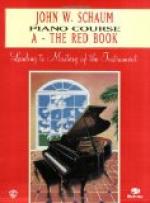At the present stage of pianistic development, an artist does not venture to come before the public and “use his notes.” No artist who values his reputation would attempt it. Everything must be performed from memory—solos, concertos, even accompaniments. The pianist must know every note of the music he performs. The star accompanist aspires to the same mastery when he plays for a famous singer or instrumentalist. We also have the artist conductor, with opera, symphony or concerto at his finger-tips. Hans von Buelow, who claimed that a pianist should have more than two hundred compositions in his repertoire, was himself equally at home in orchestral music. He always conducted his Meiningen Orchestra without notes.
Let us say, then, that the present-day pianist ought to have about two hundred compositions in his repertoire, all of which must be played without notes. The mere fact of committing to memory such a quantity of pages is no small item in the pianist’s equipment. The problem is to discover the best means of memorizing music quickly and surely. Here again we are privileged to inquire of the artist and of the artist teacher. His knowledge and experience will be practical, for he has evolved it and proved it over and over again.
It is a well-known fact that Leschetizky advises memorizing away from the instrument. This method at once shuts the door on all useless and thoughtless repetition employed by so many piano students, who repeat a passage endlessly, to avoid thinking it out. Then they wonder why they cannot commit to memory! The Viennese master suggests that a short passage of two or four measures be learned with each hand alone, then tried on the piano. If not yet quite fixed in consciousness the effort should be repeated, after which it may be possible to go through the passage without an error. The work then proceeds in the same manner throughout the composition.
ONE YEAR’S MEMORIZING
A player who gives five or six hours daily to study, and who has learned how to memorize, should be able to commit one page of music each day. This course, systematically pursued, would result in the thorough assimilation of at least fifty compositions in one year. This is really a conservative estimate, though at first glance it may seem rather large. If we cut the figure in half, out of consideration for the accumulative difficulties of the music, there will still remain twenty-five pieces, enough for two programs and a very respectable showing for a year’s study.
It may be that Leschetizky’s principle of memorizing will not appeal to every one. The player may find another path to the goal, one more suited to his peculiar temperament. Or, if he has not yet discovered the right path, let him try different ways till he hits upon one which will do the work in the shortest and most thorough manner. All masters agree that analysis and concentration are the prime factors in the process of committing music to memory.




